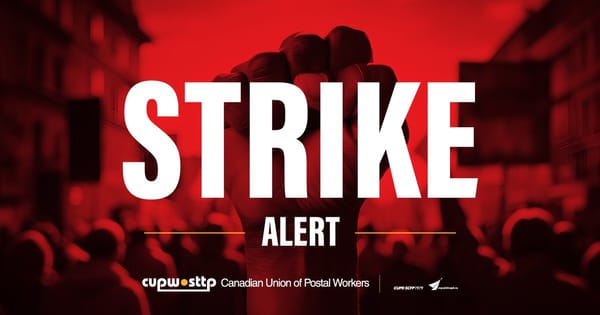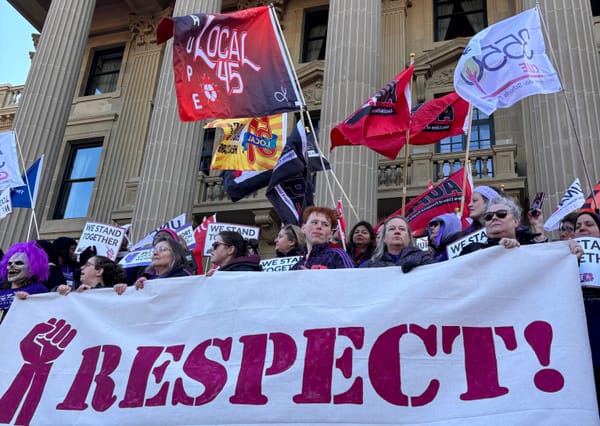
In a win for the entire labour movement, workers at the Toronto Transit Commission (TTC) can now legally exercise their right to strike again. On May 8, a judge at the Ontario Superior Court ruled that legislation in effect since 2011 that removed this right is unconstitutional.
According to Justice William Chalmers, the Toronto Transit Commission Labour Disputes Resolution Act, 2011 (the TTC Act) violates union members’ Charter rights by unlawfully interfering in the collective bargaining process.
Marvin Alfred, president of the Amalgamated Transit Union Local 113 (ATU 113), which represents more than 11,000 workers at the TTC, called the decision “an historic win for transit workers in Canada.” “The court has delivered a major victory for free collective bargaining in Ontario and for our local. Our members' Charter rights have been violated for more than a decade. Fortunately, we are now able to return to the bargaining table without unfair government interference,” Alfred told the CBC. The ATU 113, along with the Canadian Union of Public Employees (CUPE) Local 2, which represents around 700 workers at the TTC, brought the application to repeal the so-called TTC Act.
Perhaps most importantly, the Court declined the current Government of Ontario’s request to delay the implementation of the ruling until after March 31, 2024, when the ATU’s current contract with the TTC expires. The union will now enter bargaining with the transit commission with the “powerhouse of collective bargaining” (i.e., the right to strike, rightfully restored).
This decision has been a long time coming. Legal challenges to unlawful interferences with labour rights can drag on, but most don’t deal with legislation from more than a decade ago. The TTC Act was passed in 2011 by the Liberal government of Dalton McGuinty, eliminating transit workers’ right to strike and imposing a model of compulsory arbitration.
While the Ontario Liberals dropped the legislative hammer on transit workers, the attack was decidedly bipartisan and inter-jurisdictional. Municipal politics in Toronto in the mid-2000s had been shaped by public sector strikes and labour conflict. Doug Ford’s late brother, Rob Ford, rode to power as a mayor of Toronto in part by promising to crack down on unions in the municipal public sector. Declaring the TTC an essential service and outsourcing garbage collection to attack unionized city workers were central planks of the latter Ford’s blatantly anti-labour 2010 campaign.
Rob made his hay out of attacking municipal union members, but it was previous incumbent David Miller who had requested that city staff undertake an extensive review on the impacts of TTC work stoppages and the potential of declaring public transit an essential service in Toronto. In 2008, against the recommendations of the city review, council voted against a motion to request that the province bring forward essential service legislation.
After the 2010 election, Rob and the new council went ahead with the plan to request provincial intervention. Interestingly, the CHIEF general manager of the TTC at the time, Gary Webster, opposed the request for essential service legislation and claimed that the union’s ability to strike had actually produced “effective results” at the bargaining table. The decision to attack transit workers and their union was therefore thoroughly political.
If TTC management didn’t originally support the legislation, they nevertheless quickly made use of it. In its submission to the Superior Court, the ATU argued that the conduct of management was noticeably “less respectful and less reasonable” during rounds of bargaining after the TTC Act came into force. The former president of ATU 113 claimed that bargaining agents from the TTC explicitly commented on the union’s weakened bargaining position and took union proposals less seriously because they knew workers had little recourse. For example, in the first round of bargaining under the TTC Act, the employer tabled 0 per cent wage increases and refused to budge until an arbitrator ultimately awarded workers 2 per cent increases in an imposed collective agreement.
Bargaining in the years following wasn’t much different. Four out of five rounds of bargaining between the ATU and the TTC between 2011 and 2021 required arbitration. Each time, the TTC tabled concessions, some of which would have significantly altered the terms of the collective agreement. Major union losses were largely prevented in arbitration, but this was no substitute for meaningful collective bargaining backed by a strike threat. Management remained emboldened by the TTC Act and simply disregarded the union’s proposals and generally drove a hard bargain. The restrictive legislation shielded management from having to deal with the consequences of its actions. Without the right to strike, the union had no ability to change management’s calculation.
It’s important to keep in mind that, although union members’ right to strike is protected by the Charter of Rights and Freedoms, public sector workers providing essential services can still have this right restricted so long as an alternative mechanism is provided, usually access to binding arbitration. The Ontario Superior Court decision finds that the compulsory arbitration imposed by the TTC Act in instances where a collective agreement can’t be reached at the table wasn’t a satisfactory alternative to the right to strike. As Justice Chalmers summarized: “I find that the TTC Act infringes the Applicants’ right to freedom of association under s. 2(d) of the Charter because by removing the right to strike for all TTC employees, it ‘substantially interferes’ with meaningful collective bargaining.”
According to Justice Chalmers, the government failed to demonstrate that the TTC is an “essential service” as established in prior case law. The Justice was also not satisfied by the government’s evidence that a TTC strike posed economic consequences significant enough to warrant an essential service designation.
The government chose also to argue that preventing TTC workers from exercising their right to strike was an equity issue. The government argued before the Court that a potential transit strike would disproportionately impact low-income and racialized communities in Toronto who depend on public transit.
The Court was thankfully unsatisfied with this line of argument. As Justice Chalmers concluded: “I accept that a TTC strike may have a disproportionate effect on equity-seeking groups” but “[t]he equity issue is not mentioned in the broad preamble of the TTC Act. The preamble refers to ‘serious public health and safety, environmental, and economic concerns’, but does not reference equity concerns. I am of the view that a post-facto objective that did not cause the law to be enacted cannot form the basis for [an infringement on the right to strike].” The decision further notes that many union members at the TTC are racialized and that infringing on their right to strike and bargain good wages and working conditions is also an equity issue.
The decision notes that, in addition to being a legislative overreach that unlawfully restricted workers’ right to strike, the TTC Act was a complete outlier. No other unionized public transit workers in Canada faced such a restriction.
There remains a chance that the Ford government might appeal the decision. If there’s one thing on which Liberal and Conservative governments in Ontario can agree, it’s attacking union members’ rights. As John Michael McGrath at TVO further notes, the decision may also have an impact on Toronto’s upcoming mayoral election. With unions now enjoying more favourable public opinion, how mayoral candidates and politicians at all levels respond to this news could prove challenging.
This decision is indeed an important victory. But we should also take stock of the political context which allowed such a legislative overreach in the first place. Despite municipal and provincial politicians at the time complaining about the frequency of TTC strikes, governments don’t tend to attack workers when unions are strong. They do it when they think they have the political capital to get away with it, and when unions are weak enough.
Ironically, in their submissions to the Superior Court the unions argued that the right to strike doesn’t necessarily lead to more frequent strikes, noting that over the 100-year history of bargaining between the ATU and the transit commission, more than 40 collective agreements were negotiated with only seven work stoppages. From 1992 to 2008, a grand total of 12 days were lost to strike activity. These small number of strike days, however, result from the frequency with which provincial governments legislated striking transit workers back to work, usually at the request of the city council. In this sense, the TTC Act codified what governments were doing on an ad hoc basis.
Now that workers’ right to strike is restored, it’s up to the unions to use it, and to ensure the membership is ready to fight, if needed. Legal challenges can be effective, but they are time-consuming and often fail to make up for the losses incurred while unlawful legislation is in force. When it comes to protecting workers’ rights, the best defence is a good offence. Unions with engaged members ready to stand up to both the boss and the state are less likely to be the targets of draconian legislation.








Member discussion